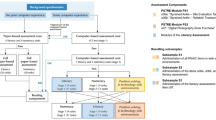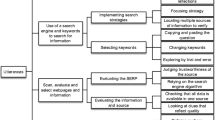Abstract
This paper reports on a study of the effects that cognitive style may exercise on information retrieval strategies. The background to the research project, the nature of cognitive style and the ways in which it may influence the learning process are discussed. Analysis of research data revealed that students' lack of information retrieval skills disallowed wide differences to emerge in terms of searching strategies. Some interesting tendencies and consistent preferences were identified with respect to the Wholist–Analytic style. The paper concludes by considering the possible existence of a searching style and discussing its interpretation.
Similar content being viewed by others
References
Child, D. (1986) Cognitive styles: Some recent ideas of relevance to teachers. In Personality, Cognition and Values, C. Bagley and G. K. Verma (eds). The Macmillan Press Ltd, London.
Douglas, G. and Riding, R. J. (1993) The effect of pupils cognitive style and position of prose passage title on recall. Educational Psychology, 13, 385–393.
Heller, R. (1990) The role of hypermedia in education: A look at the research issues. Journal of Research on Computing in Education, 22(4), 431–441.
Messick, S. (1985) Style in the interplay of structure and process. In New Directions in Educational Psychology: 1. Learning and Teaching, N. Entwistle (ed). The Falmer Press, London.
Messick, S. and Associates (1976) Individuality in Learning. Jossey-Bass, San Francisco.
Messick, S. (1995) Cognitive styles and learning. In International Encyclopedia of Teaching and Teacher Education (second edition), L. W. Anderson (ed). Elsevier Science Ltd, Oxford.
Moran, A. (1991) What can learning styles research learn from cognitive psychology? Educational Psychology, 11(3/4), 239–245.
NCET (1994) CD-ROM in Education: CD-ROM in Primary Schools, Initiative 1994, CD-ROM Titles Review. NCET, Coventry.
Perzylo, L. (1993) The application of multimedia CD-ROMs in schools. British Journal of Educational Technology, 24(3), 191–197.
Riding, R. J. (1991) Cognitive Styles Analysis. Learning and Training Technology, Birmingham.
Riding, R. J. (1996) Learning Styles and Technology-Based Training. DFEE, Education and Training Technologies, Sheffield.
Riding, R. J. (1997) On the nature of cognitive style. Educational Psychology, 17(1/2), 29–49.
Riding, R. J. and Ashmore, J. (1980) Verbaliser–Imager learning style and children's recall of information presented in pictorial versus written form. Educational Studies, 6, 141–145.
Riding, R. J. and Caine, T. (1993) Cognitive style and GCSE performance in mathematics, English language and French. Educational Psychology, 13, 59–67.
Riding, R. J. and Chambers, P. (1992) CD-ROM versus textbook: A comparison of the use of two learning media by higher education students. Educational Training and Technology International, 29(4), 342–349.
Riding, R. J. and Cheema, I. (1991) Cognitive Styles – an overview and integration. Educational Psychology, 11(3/4), 193–215.
Riding, R. J. and Douglas, G. (1993) The effect of cognitive style and mode of presentation on learning performance. British Journal of Educational Psychology, 63, 297–307.
Riding, R. J. and Pearson, F. (1994) The relationship between cognitive style and intelligence. Educational Psychology, 14, 413–425.
Riding, R. J. and Rayner, S. (1998) Cognitive Styles and Learning Strategies: Understanding Style Differences. David Fulton, London.
Riding, R. J. and Sadler-Smith, E. (1992) Type of istructional material, cognitive style and learning performance. Educational Studies, 18, 323–340.
Schmeck, R. R. (1988) An introduction to strategies and styles of learning. In Learning Strategies and Learning Styles, R. R. Schmeck (ed). Plenum, New York.
Sparrowhawk, A. (1995) Report on initial findings from schools in the primary CD-ROM initiative and visited during the Autumn term. MICRO-SCOPE, 45, Summer, 9–12.
Tannenbaum, R. S. (1998) Theoretical Foundations of Multimedia. Computer Science Press, W. H. Freeman and Company, New York.
Author information
Authors and Affiliations
Rights and permissions
About this article
Cite this article
Drenoyianni, H., Selwood, I. & Riding, R. Searching Using ‘Microsoft® Encarta™’. Education and Information Technologies 7, 333–342 (2002). https://doi.org/10.1023/A:1020913605313
Issue Date:
DOI: https://doi.org/10.1023/A:1020913605313




